
"Hotel Nacional" is a song by Cuban-American recording artist Gloria Estefan. It was released as the second single from her studio album Miss Little Havana (2011). Written by Estefan, the song portrays the need to dance, going to parties and being glamorous. On February 3, 2012 a sneak peek of the video for the song was provided to an audience at the American Airlines Arena in Miami, Florida.
The Billboard Hot Latin Songs is a record chart in the United States for Latin songs, published weekly by Billboard magazine. Since October 2012, chart rankings are based on digital sales, radio airplay, and online streaming, and only predominantly Spanish-language songs are allowed to rank. The chart was established by the magazine on September 6, 1986, and was originally based on airplay on Latin music radio stations. Although the chart predominantly allows Spanish-language songs, songs in English and Portuguese have charted.

"Cómo Me Duele Perderte" is a song by Cuban American singer Gloria Estefan from her ninth studio album, Alma Caribeña (2000). The song was written by Marco Flores with her husband Emilio Estefan and Roberto Blades handling its production. It was released as the album's second single by Epic Records on July 10, 2000. "Cómo Me Duele Perderte" is a salsa and bachata track that narrates the singer in pain of losing someone. The song was met with unfavorable reactions from music critics who criticized its arrangements and the singer's efforts. Commercially, the song topped the Billboard Hot Latin Songs and Tropical Airplay charts in the United States, while also peaking at number 12 on the Dance Club Songs chart in the same country and number eight in Spain. The accompanying music video was directed by Emilio, filmed in Miami, Florida, and features dramatic scenes of Estefan in front of a mirror remembering her former lover.
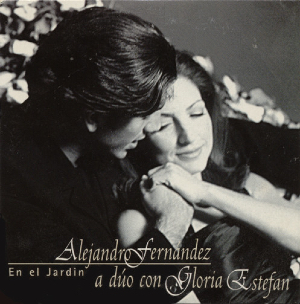
"En El Jardín" is a song written by Kike Santander and performed by Mexican recording artist Alejandro Fernández. It was co-produced by Santander and Emilio Estefan and features Cuban-American singer Gloria Estefan. It was released as the second single from Me Estoy Enamorando by Sony Music Mexico in 1997. The song is a pop ballad and portrays both singers falling in love, as if the love blossomed from a garden. A music video featuring both artists was made for the track.
"La Guirnalda" is a song written and produced by Mexican singer-songwriter Juan Gabriel and first recorded by Spanish performer Rocío Dúrcal. It was released in 1986 as the first single from Siempre, Dúrcal's tenth album produced by Juan Gabriel. The song became very successful and is often referred as one of her signature songs. According to the Billboard magazine electronic database, "La Guirnalda" holds the distinction for being the first number-one single on the Billboard Hot Latin Tracks chart on September 6, 1986, being replaced at the top by Juan Gabriel with "Yo No Sé Qué Me Pasó"; however, in the printed version of the same chart, titled "Hot Latin 50" for the week of October 4, 1986, the songs appears at number three, following "Yo No Sé Qué Me Pasó" and Emmanuel's version of "Toda la Vida". In 1989, Mexican singer Daniela Romo recorded her own version of the song and included it on her album Quiero Amanecer con Alguien. The music video for the song was shot at Puerto Vallarta Beach, Mexico.
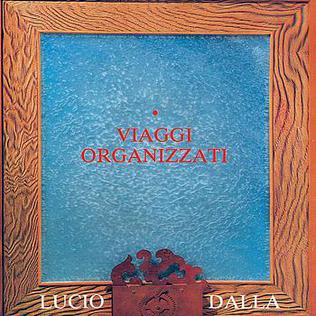
"Tutta la Vita" is a song written and first performed by Italian singer-songwriter Lucio Dalla. It was released in 1984 as the first single from his studio album Viaggi Organizzati, produced by Mauro Malavasi. This song is about a man searching for freedom all his life, trying not to fall in love, only to have a good time. For the Spanish-language market, two cover versions were released, and both peaked at number-one in the Billboard Hot Latin Tracks chart, the first by Cuban singer Franco and another by Mexican performer Emmanuel, spending three weeks each at the top position, being the first time in the Hot Latin Tracks chart history that two versions of the same song succeeded one another at the top. To date, it is uncertain who released the first cover version of the single.

"Lo Mejor de Tu Vida" is a ballad written and produced by Spanish singer-songwriter Manuel Alejandro, co-written by Marian Beigbeder, and performed by Spanish singer Julio Iglesias. It was released as the first single from his studio album Un hombre solo (1987). The song became the first by a male performer to spend 13 weeks at number one in the Billboard Hot Latin Tracks chart and held the record for the biggest leap to the top of the chart for over twenty years until Mexican rock band Maná leapt from 22 to number one with "Manda Una Señal" in 2007.
"Simplemente Amigos" is a ballad written and performed by Mexican singer-songwriter Ana Gabriel and was produced by Mariano Pérez Bautista. It was released by CBS Discos on March 20, 1989, as the second single from her fourth studio album Tierra de Nadie (1988). The song became Gabriel's second number-one single in the Billboard Hot Latin Tracks chart after "Ay Amor" in late 1987. The success of the song led its parent album to its peak at number one in the Billboard Latin Pop Albums and approximate sales of six million units in Latin America.
"¡Ay, Amor!" is a ballad written and performed by Mexican singer-songwriter Ana Gabriel and produced by Mariano Pérez Bautista. It was released as the first single from her third studio album, Pecado Original (1987). This song became the second to spend 14 consecutive weeks at number one in the Billboard Hot Latin Tracks chart, after fellow Mexican singer Daniela Romo with "De Mí Enamórate", being surpassed in the same year by Yuri when her single "Qué Te Pasa" achieved sixteen weeks at the top of the chart.
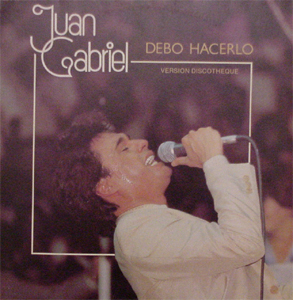
"Debo Hacerlo" is a dance song written, produced and performed by Mexican singer-songwriter Juan Gabriel. It was released as the first single from his compilation album of the same title (1987). This song became the last original song recorded by Gabriel, until 1994, due to a copyright dispute with BMG over his repertoire, and was later covered by Ana Gabriel, Nydia Rojas, Pandora, José Octavio and Aleks Syntek.
"Qué Te Pasa" is a dance song written by J.R. Florez and Gian Pietro DiFelissati, produced by Felissatti and performed by Mexican singer Yuri. It was released in 1987 as the first single from her seventh studio album Aire (1987), and became her first number-one single in the Billboard Hot Latin Tracks chart and won the Lo Nuestro Award for Pop Song of the Year in 1989.
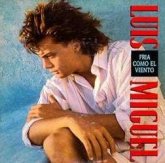
"Fría Como el Viento" is a ballad written, produced and arranged by Juan Carlos Calderón and performed by Mexican singer Luis Miguel. It was released as the first single from the Grammy-nominated studio album Busca una Mujer (1988). The song became the third number-one single for the singer in the Billboard Hot Latin Tracks chart after "Ahora Te Puedes Marchar" in 1987 and "La Incondicional", the preceding single.
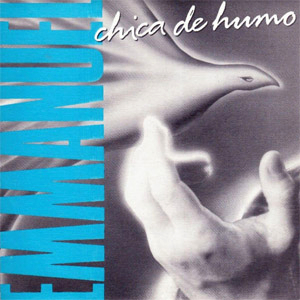
"La chica de humo" is a song by Mexican singer Emmanuel. It was written by Mauro Malavasi and María Lar, and produced by Mauro Malavasi and K. C. Porter for Emmanuel's eleventh studio album Quisiera in February 1989. Released as the second single from the album, the song became the third number-one single for the singer in the Billboard Top Latin Songs chart in late December of the same year. During live performances of the song, parts of "Gonna Make You Sweat " by C+C Music Factory are integrated during the second bridge. This version can be found on the live album Retro En Vivo. It also has been also included on some compilation albums released by Emmanuel, including Personalidad (1992), Grandes Exitos (1996) and Mi Historia Musical (2005) Due to the success of the song, the album Quisiera peaked at number 9 in the Billboard Latin Pop Albums chart in 1990. It is recognized as one of Emmanuel's signature songs.
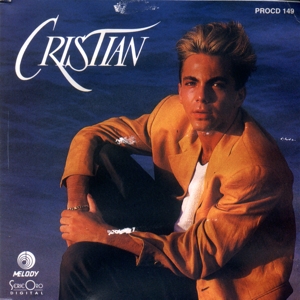
"Nunca Voy a Olvidarte" is a song written by Roberto Belester and first recorded by Mexican grupero band Bronco for their album Salvaje y Tierno (1991). In the song, the protagonist is leaving and vows to never forget the time he spent with his lover. In 1993, Mexican singer-songwriter Cristian Castro covered the song on his album, Un Segundo en el Tiempo. Castro's version peaked at number-one on the Billboard Hot Latin Songs chart in the United States became his first number-one single.
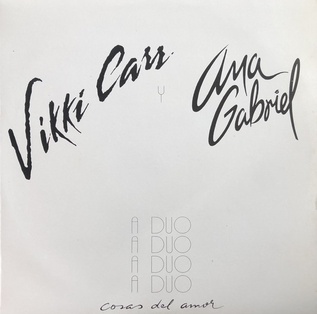
"Cosas del Amor" is a song by American recording artist Vikki Carr and Mexican singer-songwriter Ana Gabriel. It was released as the lead single from Carr's studio album Cosas del Amor (1991). Written by Roberto Livi and Rudy Pérez, the song portrays the relationship between two friends and confidences between both due to marital problems of one of them.
"Inolvidable" ("Unforgettable") is a song written by Julio Gutiérrez in 1944. It is considered one of the most popular boleros released during the Cuban musical movement led by pianists. The song has been recorded by several performers, including Roberto Carlos, Diego El Cigala, Fania All-Stars, Eydie Gormé, Danny Rivera, Tito Rodríguez and Bebo Valdés, among others.

"Si Piensas, Si Quieres" is a Latin pop song performed by Brazilian singer-songwriter Roberto Carlos from his studio album Super Héroe (1991). The track was written by Alejandro Vezanni and Roberto Livi, produced by Livi and features vocals by Spanish performer Rocío Dúrcal. It was released as the album's lead single in Latin America and the United States. A Portuguese-language version of the song was also recorded as "Se Você Quer" with featured vocals from fellow Brazilian singer Fafá de Belém.
"Detrás de Mi Ventana" is a Latin pop song by Mexican recording artist Yuri from her studio album Nueva Era (1993). The track was written by Guatemalan singer-songwriter Ricardo Arjona. It was released as the lead single in Latin America and the United States, peaking atop the Billboard's Latin Songs chart, becoming the third number-one song in the chart for the singer and the first for Arjona as a songwriter.

"Si Tú Supieras" is a song written by Kike Santander and performed by Mexican recording artist Alejandro Fernández. It was co-produced by Santander and Emilio Estefan and was released as the first single from Me Estoy Enamorando by Sony Music Mexico on 18 August 1997. The song is a bolero-pop ballad with ranchera influences and portrays the singer yearning for his lover to know how much she means to him. A music video was made for the track and was used as the main theme for the Mexican telenovela María Isabel.
This is a list of notable events in Latin music that took place in 1986.














